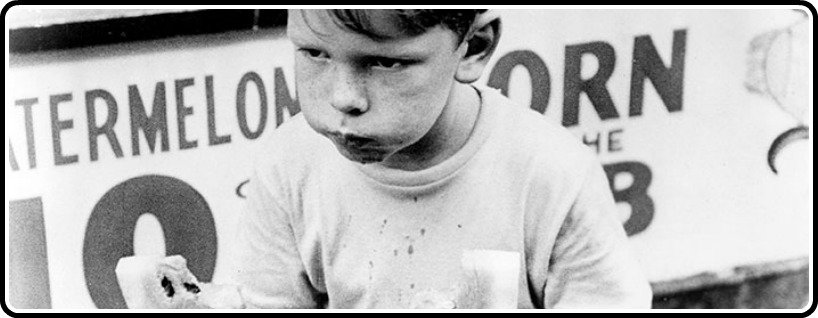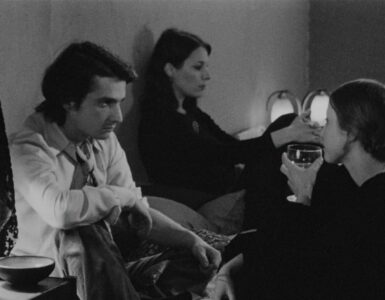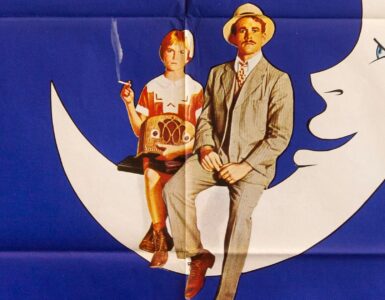American Independent cinema often sees its earliest (or at least most seemingly influential) roots in either the Miramax-fueled days of the late ‘80s-early ‘90s, or the BBS era of late ‘60s-early ‘70s masterpieces like The Last Picture Show and Easy Rider. However, one of the earliest American indies not only helped spark a movement of more intimate dramas here stateside, but may be as influential on foreign filmmakers as any film of its day.
From director Morris Engel, the 1953 classic Little Fugitive has finally made its way onto Blu-ray, and thanks to Kino Lorber, we can all bask in a gorgeous new transfer of this rarely discussed masterpiece.
The Oscar nominated drama is as simple a story as it is a simple piece of cinema. The film follows the story of Joey Norton, a young seven-year-old boy who after being convinced by a couple of boys that he shot and killed his brother, goes on the run. Finding his way to Coney Island ,the film primarily takes place here, and is a coming of age story about a young boy having his first run-in with the real world set against a backdrop of beaches, games and the ever magnetic boardwalk.
One of three films directed by Engel, the film is as much a tone poem about childhood as it is an actual piece of cinema. Now best known as one of the bigger influences on the French New Wave, this can be seen as as much of a father figure to a film like Francois Truffaut’s The 400 Blows as anything, even Jean Vigo’s Zero De Conduite. And Engel is the reason why.
While nowhere near as stylized as any film made by the French New Wave (particularly Truffaut who took this type of story and gave it a startlingly anarchic spin with the aforementioned masterpiece), the film feels as much a brother of Truffaut’s debut as it does a film like Slacker or even mumblecore pictures released today. The camera rarely offers up any sort of flourish (save for the occasional moment on the boardwalk), but instead we become privy to a story truly from the eyes of a child. Engel’s camera sees the world as a young child would. It’s big, bombastic and most of all enlightening.
Made ostensibly by a crew best known at the time for still photography, the film’s muted aesthetic offers up a great deal of drama, which within this film comes simply, but powerfully. The setup is cut and dry, and while this isn’t a film that will leave you scratching your head about what it’s trying to do, it’s emotion is powerful and the script here oozes truth and realism. Like Cassavetes film minus the energy, the film is a neo-realist gem that uses seemingly unwritten dialogue and a verite-style camera to immerse the viewer into a world of true childhood.
It’s also a rather touching look at childhood, as seen in America. With everything from cowboys to baseball seen throughout the film, we see that, now 60 years after the release of the film, the world truly hasn’t changed all that much for American youngsters. A time capsule of pure blooded Americana, Little Fugitive may be void of anything resembling drama, but it makes up for it in its ability to set a mood, and evoke pure emotion.
Inducted into the National Film Registry in 1997, the film is one of the least talked about classics to hit Blu-ray in quite some time, and yet, Kino gives it one hell of a release. The transfer, both visual and audio, are truly superb. The black and white photography comes to life here, and while the dubbed dialogue is really quite noticeable here, it all seems to fit the shoestring aesthetic here. Supplements here include a commentary from director Morris Engel that is rather solid and insightful with regards to the film’s production, a trailer and photo gallery, as well as two short films from Engel’s daughter, Mary. Looking at both Morris Engel and fellow co-director Ruth Orkin, these shorts are non-fiction shorts, and add some context to the picture and those behind it.
Overall, while this film may not be at the top of anyone’s list of must-own Blu-rays, this is definitely an interesting release. With a great transfer, Little Fugitive has never looked better, and seen as one of the best American independent films of its time, this is definitely a film that should be seen by any cinephile. And what better way to do that than in the form of a fantastic Blu-ray.






![Bergman Island (The Criterion Collection) [Blu-ray]](https://criterioncast.com/wp-content/uploads/2022/11/bergman-island-the-criterion-collection-blu-ray-400x496.jpg)
![This Is Not a Burial, It’s a Resurrection (The Criterion Collection) [Blu-ray]](https://criterioncast.com/wp-content/uploads/2022/11/this-is-not-a-burial-its-a-resurrection-the-criterion-collection-blu-ray-400x496.jpg)
![Lars von Trier's Europe Trilogy (The Criterion Collection) [The Element of Crime/Epidemic/Europa] [Blu-ray]](https://criterioncast.com/wp-content/uploads/2022/11/lars-von-triers-europe-trilogy-the-criterion-collection-the-element-of-400x496.jpg)
![Imitation of Life (The Criterion Collection) [Blu-ray]](https://criterioncast.com/wp-content/uploads/2022/11/imitation-of-life-the-criterion-collection-blu-ray-400x496.jpg)
![The Adventures of Baron Munchausen (The Criterion Collection) [4K UHD]](https://criterioncast.com/wp-content/uploads/2022/11/the-adventures-of-baron-munchausen-the-criterion-collection-4k-uhd-400x496.jpg)
![Cooley High [Criterion Collection] [Blu-ray] [1975]](https://criterioncast.com/wp-content/uploads/2022/11/cooley-high-criterion-collection-blu-ray-1975-400x496.jpg)